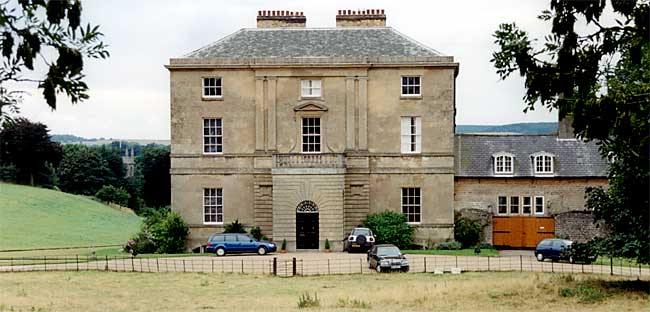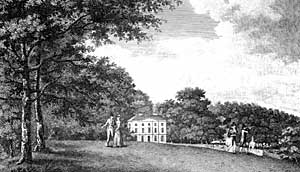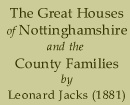< Oxton | Contents | Rampton >
Papplewick Hall and a political retrospective

The east front of Papplewick Hall (A Nicholson, 2003).
IN the burial ground belonging to Papplewick Church there is a grand, sombre yew, and just beyond the spread of its sheltering branches is to be observed a tomb of more pretension than the rest of the graves, which are chiefly marked by such humble memorials as one is accustomed to see in a country churchyard. The lettering upon the stone informs us that eighty years ago the remains of the Right Honourable Frederick Montagu were consigned to their last resting place. In 1787 Mr. Montagu built Papplewick Hall, and, for some thirteen years, chiefly lived there when he was not occupied in the service of his country. Mr. Frederick Montagu was a man of some consequence. He was appointed a Lord of the Treasury, in 1782, when Lord Rockingham was at the head of the Government, and again, in 1783, he held office under the Duke of Portland, though only for a short time. The Papplewick estate still forms part of the very large property belonging of the Montagus, who own some 3,300 acres of land in this county. In the quiet church at Papplewick, standing in an isolated position amongst the trees of the park, there are mural monuments, which serve to remind one of the former connection of the Montagus with this county. There is one to the memory of Lady Wearg, daughter of Lord Chief Baron Montagu, grandson of the first Earl of Manchester, a nobleman, whose family has since been raised in the peerage; and another to Charles, only son of the judge. Papplewick Church is not a shrine to which many pilgrimages are made, and the numbers who have not read the tablets on its walls will hardly know that the family to whom they refer once exercised a not unimportant influence in this county, it is so long since they resided here. Papplewick Hall has been occupied by three different tenants since the death of the minister. It has always been a desirable residence. It is beautifully situated, and its apartments are large, lofty, and well-arranged. For more than twenty years it has been the residence of Mr. Henry Fraser Walter, who, during his long tenancy, has made certain improvements, and has kept the estate in admirable order.

Papplewick Hall and grounds in the late 18th century.
Mr. Walter belongs to a family, which for a long time was associated with the political history of the county town, and no apology is needed for introducing him into this series of articles. He is a brother of one whom the late Mortimer Collins described as a " Prince of the Press." It must have been the owner of Bearwood, and the principal proprietor of the greatest and most influential newspaper in the world, of whom Mr. Collins wrote, " This week I visited the Palace of a Prince of the Press. You may see the splendid, stately house miles away, as you may feel on the other side of the world the influence of the famous newspaper that built it." The Berkshire estate was purchased by Mr. Walter’s father, and the noble mansion, which is called Bearwood, was built by him. Mr. H. F. Walter, of Papplewick, is the second of three brothers, the other two being Mr. John Walter, who has represented Berkshire in Parliament since 1859, and Mr. Edward Walter, a captain in the army, who is known as the founder of the Corps of Commissionaires. These gentlemen are descended from Mr. John Walter, of Warwickshire extraction, who died in 1784, leaving two sons, Robert, an officer in the Royal Navy, and John, the younger of whom founded the Times newspaper. Mr. Walter died at Teddington, in 1811, and his second son became joint proprietor and sole manager of the leading journal, raising it to a position which has never yet been reached by any newspaper, and which it has since maintained. Mr. Walter was twice married, his first wife being a daughter of Dr. Gregory, vicar of Ham; his second a Kentish lady. Mr. John Walter, M.P., of Bearwood, Mr. H. F. Walter, of Papplewick, and Captain Walter represent the male portion of his family. He had two daughters, one of who married Mr. Thomas Broughton Charlton, of Chilwell Hall, who was high Sheriff of this county last year. From 1841 to 1859 Nottingham was represented by a Walter ; first by the Mr. John Walter, to whose energy and ability the Times owes its unrivalled position in the world of newspaper letters, and afterwards by his son, who now represents Berkshire. In April, 1841, the late Mr. Walter was elected for Nottingham, in the Conservative interest, in the room of Sir R. Ferguson, when he defeated Mr. Larpent by 138 votes. In June of the same year there was a general election, and Mr. Walter had to undergo another contest, which he did in conjunction with Mr. T. B. Charlton ; the Liberal candidates being Sir George Larpent and Sir John Cam Hobhouse. Appealing to the electors on that occasion, Mr. Walter said they would always find him serving the just rights and privileges of the Sovereign and the aristocracy, but not unmindful of the just rights and privileges of the people, and especially of the poor. There are still some left who can remember the disgraceful scenes that took place at that election, and the resignation of Messrs. Walter and Charlton, which had the effect of preserving the tranquility of the town, and which furnishes one of the brightest incidents in the history of local Conservatism. In the following year, while the embers of party feeling were still smouldering, there was another election in Nottingham. Sir George Larpent accepted the Chiltern Hundreds, in other words, resigned his seat, and Mr. Walter was again induced to come forward in the Conservative interest. His opponent on this occasion was Mr. Joseph Sturge, who was described at that time as the exponent of teetotalism and Chartism. This compound of two elements having nothing in common with each other, was not relished by the majority of the electors, who returned Mr. Walter. The election, however, was declared void ; Mr. Walter was unseated on petition. Commenting on this circumstance, a Berkshire journal spoke of Mr. Walter’s first victory as having given that majority of one which overthrew the Ministry, and of his second as having crushed the new alliance between Radicalism and Chartism. There was, of course, another election, and the house of Bearward was again to play a prominent part in the contest. There were those who sympathised with Mr. Walter as to the result of the enquiry, which had deprived him of his seat. his high character, his unquestioned ability, his fearless independence, and his unwavering support of those principles which he believed to be might and true, had won respect for his name amongst the more intelligent section of the community, and the son was readily adopted by the party that had been so true to the father. The younger Mr. Walter—the present member for Berkshire, presented himself, and this is how he dealt with the grave charge of being young—he was then twenty-five, and fresh from Oxford—that was brought against him. He said, "I trust I shall be able to prove to your satisfaction that even youth is not without its advantages of zeal, of activity, and of increasing knowledge, which I shall be careful to improve, and which, like the spring-time of the year, though unpromising and cloudy for a time, may yet, if duly attended to, give promise of a rich and abundant harvest." But Mr. Walter’s harvest of votes was not sufficiently abundant to send him to Parliament, and the other candidate, Mr. Thomas Gisborne, was victorious by a majority of 111. At the general election four years later, Mr. Walter came forward at the eleventh hour, and was returned at the head of the poll; the late Feargus O’Connor, the promoter of a famous bubble land scheme for the advantage of the poorer residents, being second. The day after this magnificent triumph at the polling booths Mr. Walter lost his father. The Times of that day thus referred to the election and to the death of the elder Mr. Walter
"Nottingham was a name of disappointment, and, in the mouth of the enemy a name of reproach. All that survived from repeated struggles was a strong attachment in the minds of a respectable class, and a deep feeling that justice had not been done to a great man, a friend, and a benefactor. But we repeat there did not exist in any quarter, neither in the constituency, nor, we are assured in the successful candidate, any idea of attempting to retrieve the past. In this stagnant and unalterable state affairs continued till Wednesday. Then, at the eleventh hour, a rash adventure, a mere forlorn hope, was attempted by a few sanguine gentlemen, more with the view of keeping up the feeling of independence, and ruffling the equanimity of the parties in possession, than with any idea of possible success. Without a shadow of authority from Mr. J Walter,—without even his knowledge, his name was proposed. That day there was no promise of success beyond the possibly exaggerated hopes of a few ardent friends. On Thursday came the poll ; a process which usually dwindles down to nothing, such hasty and ill-advised endeavours. In this instance, however, there was a far different result. In the meantime an event had taken place, which threw a strange melancholy aspect over this singular proceeding. On the morning of Thursday, at the moment of the opening of the poll, it became generally known that he whose merits really were at issue in this contest, and whose public character it was sought justify, was no more. The injustice heretofore done to his name, the slight done to the opinions, and especially the great cause of humanity, with which he had been associated, the length, the labour, and the cost of his political exertions, the sincerity of his attachments to those whom he had once taken in hand, and the greatness of his achievements for the social and political progress of his country, were all brought before the constituency, and pressed with electric force to their minds. Nothing in the history of elections has ever equalled the sudden simultaneousness of the change. Men of all classes and minds rushed to the poll. In a few hours he, who had hardly been thought of the day before, and who was then only regarded as the heir of his father’s name, was not only at the head of the poll, but declared to be elected by a majority amounting to nearly double the number enlisted in support of the two late members. Sir J. C. Hobhouse, a Cabinet Minister, fifteen years member for Nottingham, polled 803 ; Mr. Walter, the son of that gentleman who had so often been twitted with the name of that city, polled 1,683. In solemn earnestness we commend this marvellous result to those rash politicians who think it an easy thing to stifle the energies of a great cause, and the honours of a good name. Mr. Walter was not only unseated, not only flouted continually with the failure of his political cause, but out of the statesman’s way,—he was at last removed from this troublesome scene. But, ‘even in their ashes live their wonted fires,’— the very day after his departure his name and his cause, in the very scene of his reverses, triumphed far beyond his utmost expections. One day closed his political career, the next day commenced, with the brightest auspices, a career we hope not less useful and honourable."
At the election of 1852 Mr. Walter was again returned for Nottingham as a Liberal-Conservative, together with the late Lord Belper, then Mr. Edward Strutt, a third candidate, Mr. Charles Sturgeon, described as a Chartist, and receiving 512 votes, being placed at the bottom of the poll. In the following year Mr. Strutt accepted office in the Government, and was returned again without opposition. In 1856 the senior member was raised to the peerage, and the late Mr. Charles Paget was elected in his stead. In 1857 there was another general election, and Mr. Walter again offered himself as a faithful follower of the policy of Lord Palmerston. The other candidates were Mr. Paget and Mr. Ernest Jones, the latter of whom sought unsuccessfully to revive the languishing popularity of Chartism. A fourth candidate, Mr. Samuel Fox, of High-street, was nominated, but his nomination was not seconded, and he was, therefore, excluded from the list. On that occasion Mr. Walter told the people in a speech, in which he warmly advocated the Palmerstone policy, that Nottingham lace would find its way into China, a piece of prophecy, which has perhaps been justified by the development of the staple trade. For a third time Mr. Walter was elected for Nottingham, in 1857, on independent principles, and, in 1859, lie transferred his political services to his native county, in which he has so large a stake. Seeing that the name of Walter was so intimately connected with the politics of this borough for close upon twenty years, during a not unimportant epoch in the history of this country, and looking at the influence it has commanded, and still commands, the foregoing retrospect will not be considered out of place in an article dealing with the residence of one bearing that name, who has lived in this county since the year following his brother’s last election for Nottingham.
The drawing room at Papplewick is of handsome proportions, and the decorations of walls and ceiling have been much admired by those who have seen them. The doors of mahogany, close-fitting and smooth, are about the finest in the county. Three or four handsome walnut cabinets form part of the decorative furniture of this apartment. They contain a wonderful collection of birds’ eggs—perhaps the best private collection in England. The eggs are arranged in layers of drawers, and are properly named and classified, some attention having been paid to the placing of the different sizes and to the arrangement of colours. Some of the foreign eggs are very beautiful in colour and shape, and there is an almost endless variety, from the tiny pearl-like egg of the humming bird to that of the extinct auk or of the hairy-looking apteryx of New Zealand, a stuffed specimen of which is to be seen outside, in the hall. Eggs of the ostrich, emu, cassowary, and the ova of the alligator are preserved in larger receptacles than the drawers of these cabinets, and two of the eggs of the largest of the feathered tribe have been made into very handsome vases, which form part of the pretty ornamentation of the drawing room. There are no pictures or furniture to remind one of the Montagu connection. Formerly the dining room contained portraits of the first Earl of Sandwich, the first Earl of Halifax, the Earl of Manchester, and other family connections, but they were removed before Mr. Henry Walter knew Papplewick, and their places have not been supplied by other works of the painter. Now and again Montagu relics have been found about the estate. A short time ago a labourer in the fields discovered a discoloured plate on which were engraven the arms of the Montagus, and the relic was duly forwarded to the present owner of the family estates. The hall enjoys a charming situation, and the country round is historical and full of interest. From an eminence not many yards distant from the hall, the grey walls of Newstead are to be seen, and dark woods and gentle hills, green with pasture grass, or golden with ripening corn, help to make up a pleasant and refreshing landscape. Papplewick was the favourite residence of Mr. Frederick Montagu. He liked this solid and comfortable house and the picturesque and fertile estate attached to it, and, writing to a friend, he says, with a touch of playful irony, that in the solitudes of his Nottinghamshire home he felt as happy as if he were listening to the overloaded speeches of Lord Shelburne at the Treasury. Since those days collieries have sprung up in the neighbourhood, and their smoke is blown across a landscape, which was once so still and unfrequented that outlaws roasted their venison within its recesses, and found a hiding place among its bills. On the side of one of these hills close to the hall, there is a small cavern, which legend says was used by the most famous of all outlaws, as a place of shelter for his horses, and to this day it is called Robin Hood’s stable. If Mr. Walter had lived at Papplewick in those days and had bred famous Berkshire pigs, as he does now, it is probable that the venison diet of Robin Hood and his followers would have been varied by the introduction of roast pork, and that the black swine which now pass a lazy, comfortable life in the adjoining farm yard would not have been so secure. In its material aspects the country round about is much as it was long ago, and the tenant of Papplewick enjoys some of the prettiest scenery in the county, with the comforts of a refined and cultivated English home.
